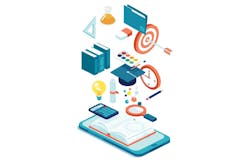At the time of this writing, we find ourselves right in the middle of the COVID-19 pandemic. Large scale changes have hit our nation and small businesses like ours have been deeply affected. Even though auto body is considered an “essential business,” that certainly does not mean it’s business as usual. Our car count is down by 50 percent. We have furloughed over half of our workforce. Several members of our leadership team who are not in direction operations are working from home full-time now.
These are massive, unpredicted shifts. All our grand plans for 2020 are now either on hold or discarded. Now we pivot plans and tactics constantly to meet the ever-evolving challenges, while still holding as best we can to the strategies, tactics and culture that got us this far.
Last week, I attended a COVID-19 response webinar with business coach Shawn Lovejoy. He said there are five things leaders need to do to navigate times of uncertainty. He reminded us that leaders must provide hope to their teams; provide value to their customers; pivot toward new opportunities; get healthy by working on, and not just in, the business; and learn.
I want to dig a little deeper on that last one: learning.
Most states by now have orders in place for their residents to stay at home unless they absolutely must leave for groceries, medicine, or another essential service. What this means for me and likely most of you is loads of extra time at home. What a great opportunity to really dig in and learn a new skill! For many, this will be a skill that could greatly enhance their business for years to come. For others, it might be time to pursue something more personal. Personally, I decided that the first thing I wanted to learn was how to learn—rapidly.
If you’ve ever met me or read this column before, it’s pretty obvious that I love to learn. I’m always in the middle of an audio book, typically playing whenever I’m in the car alone. I start every day by reading from several different books. I end my day in bed with my Kindle literally falling out of my hand as I drift off to sleep. In addition to this, I listen to a variety of podcasts. I regularly attend webinars. And I’m currently enrolled in a program through my church to learn more about theology.
My challenge sometimes is that I’m like a bee collecting pollen from all these different sources. And while it’s great to cross-pollinate from several different places sometimes my learning can lack depth and mastery. Jack of all, master of none.
I heard a podcast recently from Tim Ferriss where he talked about the idea of “rapid, deep learning.” He said that in about six months time of very focused learning on almost any topic, we can become proficient. He reduced what rapid learning requires to four components:
- Deconstruct. You start by taking the skill you want to learn and break it into smaller blocks of things that must be learned for mastery.
- Selection. Out of those larger blocks, choose the 20 percent of them that will give you 80 percent of mastery.
- Sequencing. Arrange the blocks in the order they need to be learned.
- Stakes. Find meaningful rewards or consequences that will keep you motivated to learn.
For a quick example, consider accounting:
Deconstruct. The big blocks of learning for accounting might be accounting software, preparing financial statements, taxation, ledgers, etc.
Selection. Since you likely already have an accountant for your business, you decide you don’t need to know all about tax law. And you may already have a bookkeeper who handles the accounting software side. So perhaps learning deeply about five financial reports is more what you need. You decide to focus on profit and loss statements, balance sheet, cash flow report, income statement, and accounts payable and receivable. In this step you need to decide which books, online classes, or free YouTube tutorials you need to engage to gain proficiency.
Sequencing. Let’s say you decide to learn about the weekly reports you get from your bookkeeper first. That would be cash flow, then AR/AP and income. The next two reports come from your accountant monthly so you decide a deeper dive on profit and loss and balance sheet round out the reports you want to master over the next two or three months.
Stakes. A meaningful reward might be something like a steak dinner with your spouse when you complete an online course for each report. So, over the next six months, you could get five amazing date nights in! The consequence could be something like you have to give a competitor $500 if you don’t complete the learning in six months! A milder version might be you make a donation to a favorite charity of $100 for every target date you miss for the learning.
If you find that you have some extra time on your hands, Netflix is always an option. But think of the pay off for that versus intentional learning. Honestly, it’s a bit of both for me! Over the next several weeks consider this question: What might I learn that could propel my shop forward for months or even years? What learning could give me a competitive edge when all the dust settles from this season?
About the Author

Kevin Rains
Kevin Rains is the owner of Rains CARSTAR Group with locations in Cincinnati, Ohio; West Chester, Ohio; and Lexington, Kentucky. He is also an industry consultant. He can be reached at [email protected].
